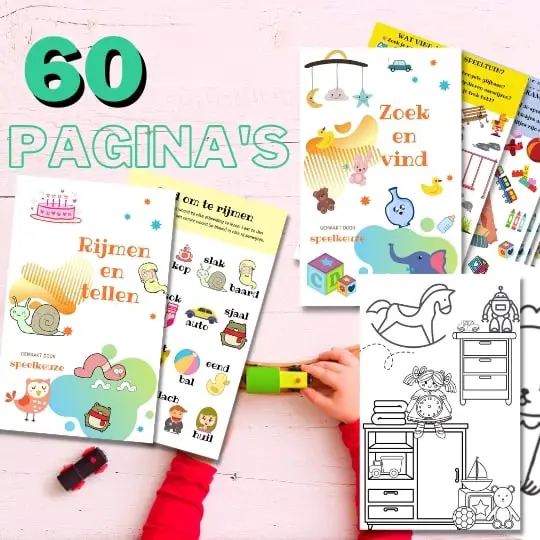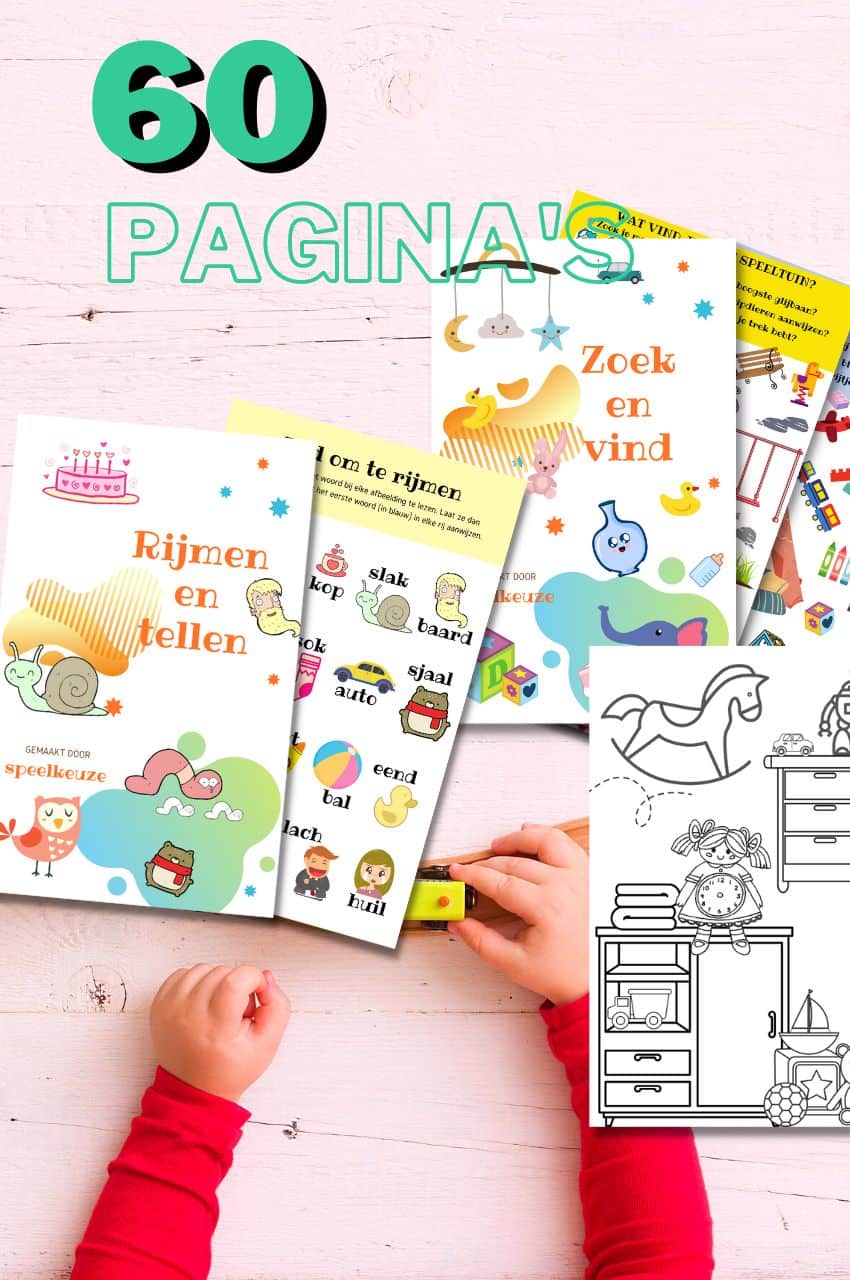Toddler plays that he is a baby or an animal | setting boundaries and tips

Always something to do for the holidays or rainy day?
Play Choice now has the ultimate activity book collection, with over 60 pages of fun coloring pages and educational puzzles.
Many parenting questions boil down to: is this a thing or is something wrong?
I also occasionally write an article like this about crazy antics with play, and now I've found another interesting one for you that you might recognize.
My toddler often plays that he is a baby, should I do something about that?
In this article, see why he pretends and whether it is harmful.

The problem:
My toddler crawls around the house as a baby saying goo-goo-ga-ga, he thinks he's a baby, and if you talk about something else, do something else or ask him to do something else, forget it .
He is a baby and does not answer questions in Dutch, only baby language.
This can be particularly exhausting when it comes to him
- to eat his breakfast,
- or put on his shoes,
- or take him to the shelter
Many more people have a similar problem, maybe not an exact baby game, but each child can choose their own thing.
For example, I've heard of parents who, every time they tried to convey to their almost 3-year-old girl something she didn't want to hear, she meows like a pussy.
It's cute but, frankly, you must actually be in awe of the perfect passive aggressiveness of it.
I wish I could meow at people sometimes during meetings instead of responding pleasantly to unreasonable requests.
But let's take a step back for a moment.
There are two separate questions to answer:
- is it normal for children to pretend for a long time?
- and how do you get them out when you need them to get out the door in the morning?

From toddler to toddler activity book collection
Educational games and coloring pages for 3 to 6 years
Your toddler and preschooler will love this e-book, along with the accompanying printables. He or she can play with it at every stage of development, together with mom and dad.
Buy at Bol.comWhat we discuss in this comprehensive post:
Why do toddlers like to pretend to be babies or animals?
It is typical behavior for children under 5 to like to pretend to be animals or babies (or adult professions or fantasy characters).
At that age, they do a lot of research into what it is like to be someone else, to feel something different, to interact with other people in different ways.
The cognitive development task that children work on through this exploration is called "theory of mind."
It is the idea that "other people have thoughts too, and those thoughts may be different from your thoughts".
Children begin to grasp the concept of theory of mind around 18 months, but it takes years before they fully understand that, as psychologist Andrew N. Meltzoff put it, other people are “more than dynamic bags of skin that can be seen, heard and weighed”.
By pretending to be other people and beings and sometimes making imaginary friends, children may be working towards a deeper understanding that other people have thoughts, feelings and beliefs that they know nothing about and cannot see on the surface.
How do you set limits to the fantasy game?
If you can identify your child's intentions, you can find out how to handle their behavior.
In general, there are four common reasons why your child may assume a role as a baby at this age:
- avoid something (meow instead of responding to a question)
- getting attention (negative attention counts too!)
- get something they want (ask for milk with baby cry)
- or to communicate (this is especially important for children who do not yet have strong language skills).
When a child is a baby or a lion at appropriate times, you don't want to suppress their amazing imaginations.
Children this age can often feel powerless, so it is helpful to be empathetic to their lack of control over their lives and to give them choices when it is reasonable.
Those caveats are included here in this advice for setting healthy game boundaries on games that are not convenient for a while, or can be used as a sneaky delaying tactic.
Set a timer
If you don't have the time or patience to
- to romp extensively on the savannah,
- throw toys so your dog child can retrieve them
- or trying to communicate with a blaring baby
let your child know in advance that their Games will be limited, then set a timer (on your phone or elsewhere) for 2 minutes.
When the alarm goes off, your child knows babyhood is over.
Use your words
If the play comes out at the wrong times (e.g., when you're trying to dress your child, or in the store, for example), create guidelines for when the play is appropriate using child-friendly language,
The baby may come to play after you get dressed, or when we get home from groceries, or whatever the situation is.
You can also choose to interpret the meows or roars in a way that suits you toddler not enthusiastic about it.
If your child keeps babbling like a baby while eating, you can say, "Oh, I think meowing means you want to eat all your broccoli now."
That should get them to use human words pretty quickly.
Take away the attention
If the babble is used to get extra (yet unnecessary) attention, ignore their behavior and only pay attention to the correct behavior.
If you ask your child a question and she babbles, meows, or roars, despite having the language skills to express herself, you can say, “I'm going to talk to you as soon as your big girl voice comes back,” and walk away until she's ready. is to talk to you in human words.
If the child is the one asking, the request should not be granted until it asks as a person and not as a baby.
Provide support
If your child is in fact having trouble communicating, give them a language help.
If he asks for a colored pencil by pointing at the object and using, say, a babble or a roar, point to the colored pencil and say, “Do you want the colored pencil? Okay, I'll give you this colored pencil. ”
If he cries baby when he's upset, try getting him to use those emotional words too. “You seem sad. Are you sad? Can we take a deep breath and talk about what's wrong? ”
Can playing games with your toddler eliminate baby behavior?
Yes, playing with your toddler can help gradually eliminate baby behavior. Toddlers learn through play and interaction with their parents is essential for their development. Playing games with your toddler gives them that attention in a positive way and can help them become more independent and self-reliant as they grow. It is a natural transition from baby to toddler behavior.
You can even play games about the transition from baby to toddler to take them into their new life as a toddler.

Always something to do for the holidays or rainy day?
Play Choice now has the ultimate activity book collection, with over 60 pages of fun coloring pages and educational puzzles.
Joost Nusselder, the founder of Speelkeuze.nl is a content marketer, father and loves trying out new toys. As a child he came into contact with everything related to games when his mother started the Tinnen Soldaat in Ede. Now he and his team create helpful blog articles to help loyal readers with fun play ideas.